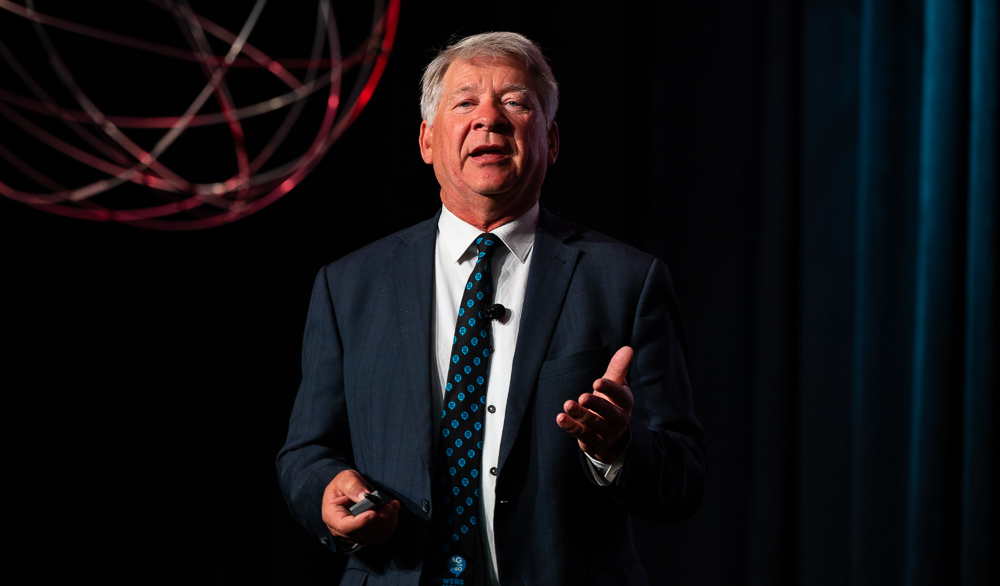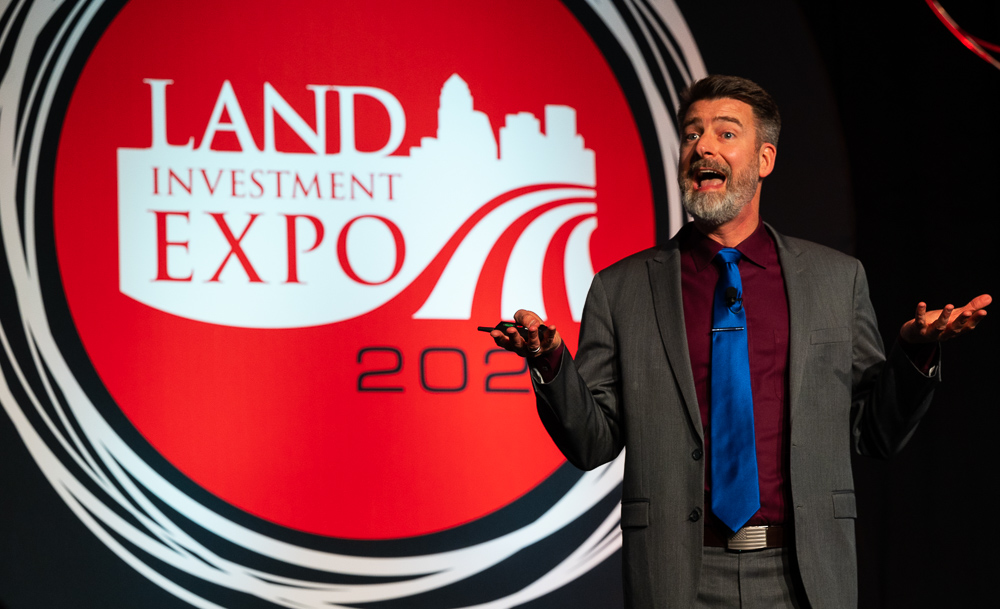
Robert Saik, an agronomist and serial entrepreneur, speaks at the 2021 Land Investment Expo in Des Moines. (Photo: Joseph L. Murphy/Iowa Soybean Association)
Geopolitics and agriculture trends explored at Land Investment Expo
January 14, 2021
Autonomous robots that plant thousands of acres and a global community absent China's threat – sound crazy? Not according to two speakers at the 14th Land Investment Expo held this week in Des Moines.
About 800 audience members, including those in-person and virtual, heard from 23 speakers on topics ranging from the farm economy to geopolitical forces impacting the globe.
Robert Saik, a professional agriculture consultant, serial entrepreneur and author of the book "FOOD 5.0: How We Feed the Future," painted a picture of a changing agriculture system in the United States and around the globe. Saik has founded more than 15 companies in the areas of farming, ag retail and distribution.
His most recent company, AGvisorPRO, mixes his experience and training in soil chemistry, plant physiology, and crop nutrition, with his knowledge in data management, farm automation, and precision agriculture. AGvisorPro is a social and connectivity platform that solves problems by pairing questions from farmers with experts worldwide.
Infinite sustainability
He told attendees of the conference that farms and farmers would soon be judged on a sustainability index. The index will give a holistic metric used by consumers, companies and farmers as they do business.
"As long as we have human beings, agriculture needs to be infinitely sustainable," Saik said.
He believes that infinite sustainability comes down to four main areas.
- Soil health
- Water use efficiency
- Greenhouse gas balance or how do we sequester carbon and reduce methane and nitrous oxide.
- Farm viability – farms have to make money to be viable.
"I don't think mainstream agriculture does a good job explaining to the consumer what we do and why we do it," he said about farm viability. "Because consumers are starting to realize that the food supply chain is important, and agriculture has done a remarkable job of meeting the needs of feeding North America."
Saik believes that farmers have a window of opportunity right now because people are concerned about food.
"We should be using this time to say we do a good job, this is what we do, and this is why we do it," he said.
One of the biggest problems facing agriculture, in Saik's opinion, is the lack of labor. Saik, a Canadian citizen,, said that it's challenging to draw young people to rural areas. Finding qualified people to run half-million-dollar machines becomes difficult, resulting in the farm's loss of efficiency.
"For broadacre farming, we are going to move to robotics," he said. "We need to take our brightest people and have them managing robots instead of sitting in a glass cage for 12 hours a day."
Saik believes that robotics and other technology will be a game-changer for sustainability, profitability and labor issues moving forward.
"The average farm generates an estimated five hundred thousand data points per day, which will grow to four million data points by 2036. Applying AI and data analysis to the aggregated field, machine, and environmental data can help improve shared insights between growers and enterprises across the agriculture ecosystem," Saik wrote in his book Agriculture 5.0.

Peter Zeihan, an Iowa native and featured speaker at the Land Investment Expo, agreed with labor's importance as he looks at geopolitical trends in the future.
As U.S. soybean farmers try to regain market shares with China after a bitter trade war, Zeihan forecasts challenges to China’s economy in the not-so-distant future.
"A lot of the pillars that underpin Chinese success are going to go away," he said. "The Chinese demographic situation is terminal, so they can't have a consumption-led economy, and with Americans removing support from the global networks, a trade based an export system is no longer viable."
Zeihan estimates that China will lose half its population in 2100 compared to 2020.
"Without sufficient young people, nothing about today's China is sustainable," Zeihan said.
Zeihan sees an economic and political crisis building on the horizon in China. That may be good news for the U.S., but he believes it will be bad news for Taiwan.
"We are going to see a Taiwan crisis," He said. "We are edging toward recognizing Taiwanese independence outright. This is the flashpoint that is coming and the Biden administration will have to decide how to handle it."
The Iowa Land Expo also featured Ambassador Terry Branstad, country music recording artist Easton Corbin, General John Kelly and former White House Communications Director Anthony Scaramucci. See the photo gallery for more information and images from the expo.
Jack Bobo, a food futurist, hits on the future of food, consumer psychology and food policy during his Land Investment Expo appearance. (Photo: Joseph L. Murphy/Iowa Soybean Association)
Ambassador Terry Branstad displays a photo of him with now Chinese President Xi Jinping from the first time they met in the early 80's.
Easton Corbin plays one of his hits during an appearance at the Land Investment Expo. (Photo: Joseph L. Murphy/Iowa Soybean Association)
Retired General John F. Kelly provides insight into the Trump Administration drawing from his experience as Chief of Staff. (Photo: Joseph L. Murphy/Iowa Soybean Association)
Secretary of Agriculture Mike Naig gives an update to audience members at the Land Investment Expo. (Photo: Joseph L. Murphy/Iowa Soybean Association)
Anthony Scaramucci provides background to events that happened while he was a part of the Trump Administration. (Photo: Joseph L. Murphy/Iowa Soybean Association)
Back